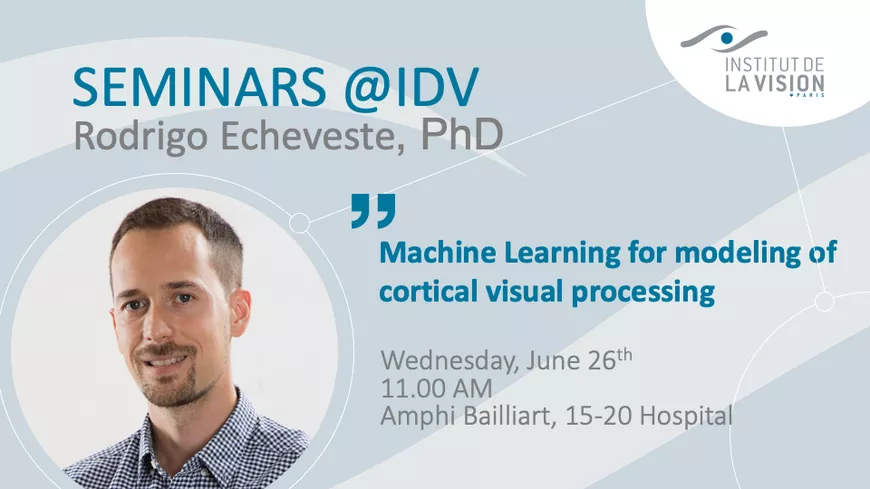Machine Learning for modeling of cortical visual processing
Invited by Matias Goldin, Rodrigo Echeveste, PhD (Adjunct Researcher from Argentina's National Research Council) will be speaking on Wednesday, June 26th at 11.00 am. RDV in the Amphithéâtre Bailliart, 3rd floor of the Hôpital national des 15-20.

Machine learning tools have become increasingly effective in recent years as a means to model sensory processing in the cortex. One of the central ideas behind this approach is that by optimizing artificial neural networks for tasks which are relevant for the brain, it is possible to find models that imitate different aspects of cortical processing. Deep convolutional neural networks (DNNs) were originally inspired by visual sensory processing, and are currently the best predictors of mean responses in multiple areas of the cortex. However, these models are not designed to faithfully represent the uncertainty of their predictions, which is central in the context of perception, where the information we receive from our senses is always partial and incomplete. Moreover, these models lack dynamics, and do not capture the rich variability in cortical responses both over time and trials.
In this talk I’ll first give a short overview of the state of the art in ML methods based on DNNs as models of cortical visual processing, to then focus on models specifically designed to faithfully represent uncertainty by performing Bayesian inference, within two frameworks. Firstly, within the sampling framework, with networks that incorporate recurrent connections in order to draw samples from probability distributions of interest. Interestingly these networks display stereotypical features of cortical dynamics, such as transients and oscillations. Finally I’ll show ongoing work on inference within the variational inference framework, particularly on how to extend classical variational autoencoders to obtain models of visual perception with well behaved uncertainty estimates.
About Rodrigo Echeveste
Rodrigo Echeveste obtained his Bachelor and Masters Degrees in Physics from Balseiro Institute in Argentina, and his PhD from the Goethe University of Frankfurt, in Germany. He then did a three-year postdoc at the Computational and Biological Learning Lab (CBL) from the University of Cambridge, UK. Rodrigo currently holds a permanent research position as Adjunct Researcher from Argentina's National Research Council (CONICET) at the Research Institute for Signals, Systems and Computational Intelligence, sinc(i), and is an Adjunct Professor at the National University of Litoral (UNL). His work lies at the intersection of Computational Neuroscience and Machine Learning. Rodrigo currently serves as Secretary of Argentina’s Society for Neuroscience Research (SAN).
